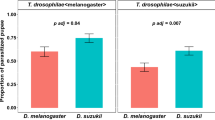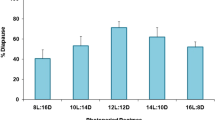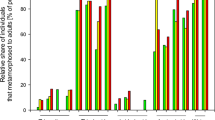Abstract
MANY thousands of pupæ of the cinnabar moth, Tyria jacobaeae L., from southern England, and a smaller consignment from central Italy, were introduced into Australia for the control of the noxious weed, ragwort (Senecio jacobaea L.), in southern Victoria. In England this moth has a strictly uni-voltine life-cycle1 that includes an obligatory pupal diapause2 lasting for an average of 270 days. Because of this diapause3, difficulties were expected in synchronizing emergence of the moths with the Australian summer—for this would require diapause to be terminated in less than 150 days or extended to at least 450 days.
This is a preview of subscription content, access via your institution
Access options
Subscribe to this journal
Receive 51 print issues and online access
$199.00 per year
only $3.90 per issue
Buy this article
- Purchase on Springer Link
- Instant access to full article PDF
Prices may be subject to local taxes which are calculated during checkout
Similar content being viewed by others

References
Cameron, Ewen, J. Ecol., 23, 2, 265 (1935).
Lees, A. D., Camb. Mon. Exp. Biol., No. 4 (1955).
Andrewartha, H. G., Biol. Rev., 27, 50 (1952).
Author information
Authors and Affiliations
Rights and permissions
About this article
Cite this article
BORNEMISSZA, G. Termination of Pupal Diapause in the Cinnabar Moth and the Reproductive Capacity of the Resulting Females. Nature 190, 936–937 (1961). https://doi.org/10.1038/190936a0
Issue Date:
DOI: https://doi.org/10.1038/190936a0
This article is cited by
-
10.1007/BF00195576
CrossRef Listing of Deleted DOIs (2011)
Comments
By submitting a comment you agree to abide by our Terms and Community Guidelines. If you find something abusive or that does not comply with our terms or guidelines please flag it as inappropriate.


